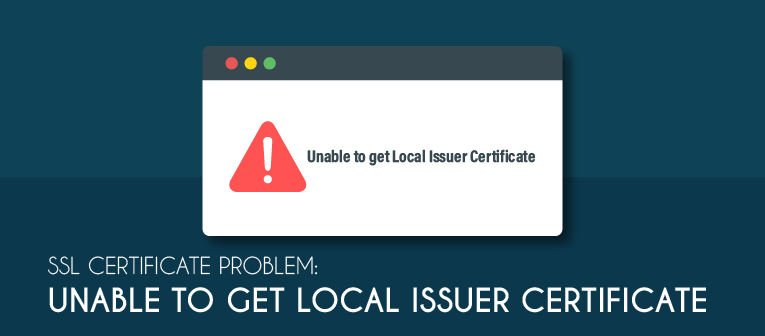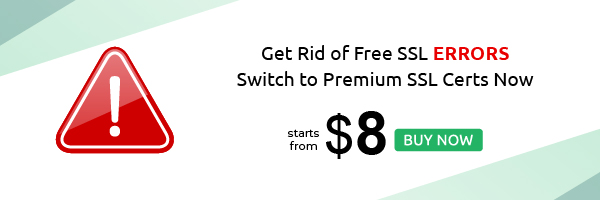Quick step by step to fix SSL certificate problem: Unable to get local issuer certificate error.
Have you experienced the ‘SSL certificate problem unable: to get local issuer certificate’ problem while attempting to move from HTTP to HTTPS? We know how overwhelming it can be to deal with this issue but don’t let that frighten you. Here, we can help you fix it with this piece of writing and don’t make the wrong decisions like uninstalling your SSL certificate.
Regardless of which error pops up or the complexities involved in fixing it, never uninstall your SSL Certificate to get rid of SSL errors as doing that could prove to be fatal and expose you to serious security risks. Always remember that your SSL certificate protects the communication exchanged between the server and the browser, which prevents data interception of a third party.
Even, data privacy laws are getting stricter by the day, and therefore, you cannot make the unwise decision to uninstall your SSL. So, your only option is to get to the bottom of the ‘unable to get local issuer certificate’ error and fix it.
Before we help you do that, let us figure out how an SSL Certificate works and why it shows up the ‘curl: (60) SSL certificate problem: unable to get local issuer certificate’ or the ‘git SSL certificate problem unable to get local issuer certificate’ errors.
Why SSL Certificate Problem: Unable to get Local Issuer Certificate Error Happen?
Your SSL certificate’s primary purpose is to confirm authentication and ensure a secure exchange of information between the server and the client by referring to the HTTPS protocol. That is only possible when you have a working root certificate that is either directly or indirectly signed by a Certificate Authority.
However, the error unable to get local issuer certificate’ occurs when the root certificate is not working properly, especially when an SSL client makes an HTTPS request and during this, the client has to share an SSL certificate for identity verification.
Therefore, you need to take the necessary actions required to help bridge the gap.
How to Fix SSL Certificate Problem: Unable to get Local Issuer Certificate?
Now that we know the reasons for the ‘unable to get local issuer certificate’ glitch, it’s time to act. You could be experiencing this glitch due to many reasons, and those reasons could vary from software interfering in the SSL/TSL session or your Git application. Once you identify the cause, it becomes a whole lot easier to fix it. If you are unable to do that, then we recommend that you try out all the fixes one after another and something will work.
1. Unverified Self-signed SSL Certificate
Anyone can sign an SSL certificate by generating a signing key; however, the OS and the Web Browser may not be able to identify that. This could be the reason why you see the ‘SSL certificate problem: unable to get local issuer certificate’ or the ‘curl: (60) SSL certificate problem: unable to get local issuer certificate error.
Solution – Buy an SSL Certificate that is authenticated by a reputed certificate Authority and install it.
2. Alter the php.ini file to solve ‘unable to get local issuer certificate’
Log in to your web control panel such as cPanel and locate the file manager. You will then find the PHP software, and inside that, you can find the php.ini file that you need to edit. Follow the below-mentioned steps.
3. Change Php.ini
- Click on http://curl.haxx.se/ca/cacert.pem and download cacert.pem.
- After that, copy cacert.pem to openssl/zend, like ‘/usr/local/openssl-0.9.8/certs/cacert.pem’.
- Finally, navigate to the php.ini file, modify CURL. Add “cainfo = ‘/usr/local/openssl-0.9.8/certs/cacert.pem’” to modify it.
- Restart PHP
- Confirm if CURL can now read the HTTPS URL.
4. Without Altering php.ini file
Use the code given below:
$ch = curl_init();
$certificate_location = ‘/usr/local/openssl-0.9.8/certs/cacert.pem’;
curl_setopt($ch, CURLOPT_SSL_VERIFYHOST, $certificate_location);
curl_setopt($ch, CURLOPT_SSL_VERIFYPEER, $certificate_location);
5. Git Users
Most Git users experience the ‘SSL certificate problem: unable to get local issuer certificate’ or the ‘git SSL certificate problem unable to get local issuer certificate’ error at some point in time. If you have encountered it, then there are two ways of solving this — the first one is a permanent fix and the second one is a temporary fix, which we shall discuss below.
6. Permanent Fix
If you are a Git user facing the ‘git SSL certificate problem unable to get local issuer certificate’ error, then you need to tell Git where the CA bundle is located.
To help Git find the CA bundle, use the below-mentioned command:
git config –system http.sslCAPath /absolute/path/to/git/certificates
7. Temporary Fix
To temporarily fix the ‘SSL certificate problem: unable to get local issuer certificate’ error, you could disable the verification of your SSL certificate. However, we recommend that you use it sparingly as it could lower your website’s security.
Use the following command to disable the verification of your SSL certificate:
git config –global http.sslVerify false
If neither of the two options work, consider removing and reinstalling Git.
Conclusion:
We are confident that one of the above ‘SSL certificate problem: unable to get local issuer certificate’ error fixes would work for you. Finally, we strongly recommend that you entirely avoid removing your SSL certificate. Your website needs to be protected, and one of your most robust defenses is an active SSL certificate.
Related SSL Errors:


